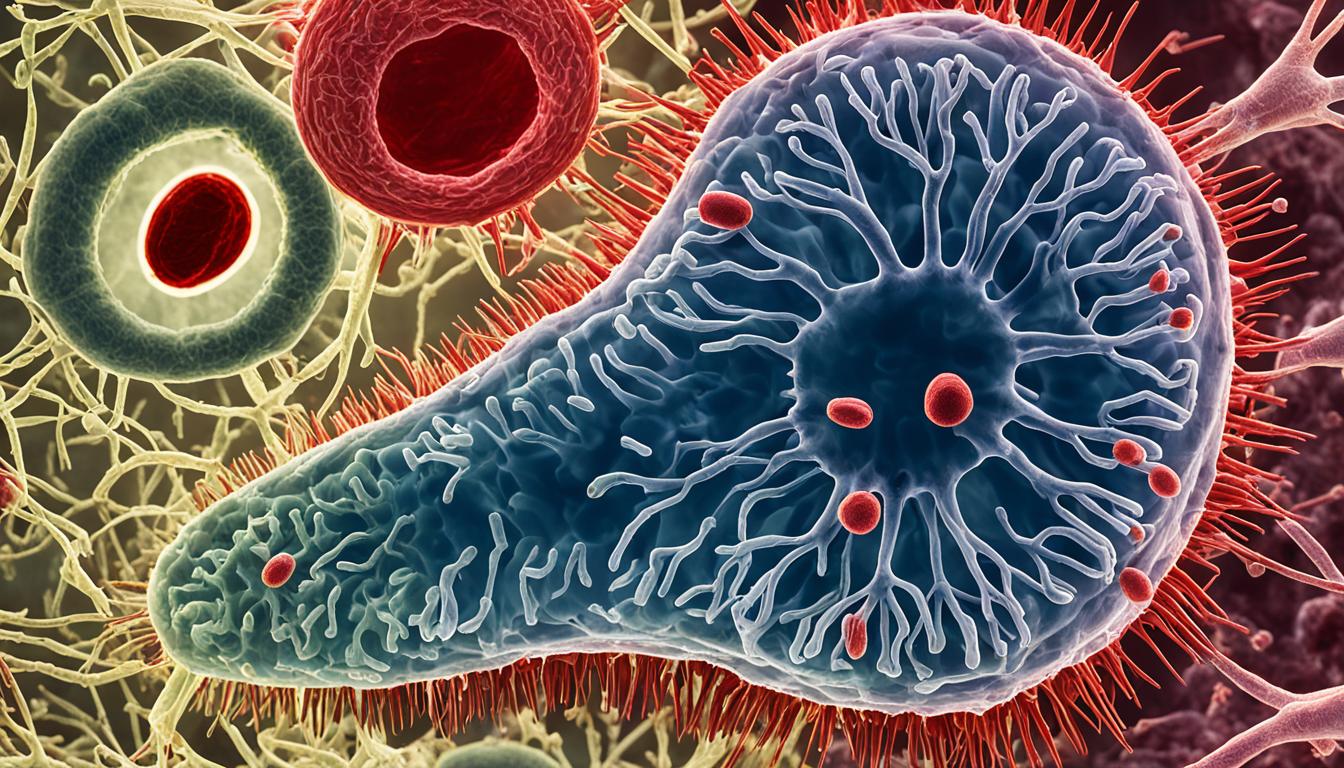Toxoplasmosis is a parasitic infection caused by the Toxoplasma gondii parasite. It’s common and can come from contact with cat litter or eating undercooked meat. This parasite can bring on a range of symptoms in humans and might lead to serious issues.
People with Toxoplasma gondii might feel like they have the flu. They could have a fever, headache, and body pains. Sick people might also have swollen lymph nodes, in addition to muscle aches and feeling tired. In worst cases, it can harm the brain, eyes, and other parts of the body.
Doctors usually diagnose toxoplasmosis with a blood test. This test finds antibodies against the parasite. Other tests, like polymerase chain reaction (PCR) or antibody tests, can show how bad the infection is.
Cat litter and undercooked meat are the main ways to get toxoplasmosis. But, it can also pass from a mother to her baby during pregnancy. It can spread during organ transplants or when people share blood.
Key Takeaways:
- Toxoplasmosis is a parasitic infection caused by the Toxoplasma gondii parasite.
- Common symptoms of toxoplasmosis include flu-like symptoms, swollen lymph nodes, muscle aches, and fatigue.
- Diagnosis is typically done through blood tests and other confirmatory tests.
- The parasite can be contracted through contact with cat litter, consumption of infected meat, or congenitally.
- Severe cases of toxoplasmosis can lead to damage in the brain, eyes, and other organs.
Causes and Diagnosis of Toxoplasmosis
Toxoplasmosis comes from a parasite called Toxoplasma gondii. It spreads by eating something with the parasite, like cat poop or dirt. Also, eating raw meat that has the parasite can make you sick.
The Toxoplasma gondii parasite can get into your body. It might infect your brain, heart, or eyes. Most people don’t show strong signs of sickness. But, it’s dangerous for those with weak immune systems.
Doctors use different tests to find out if you have toxoplasmosis. They might do:
- Antibody tests: These blood tests show if your body has fought off the infection before.
- PCR tests: These tests look for the parasite’s genetic material. They’re good for checking if the infection is recent.
- Tissue biopsy: Sometimes, doctors need to check a piece of tissue for the parasite.
In some cases, the tests might not be needed. But, if you’re very sick or have a weak immune system, you should get them. This helps doctors know how to treat you.
Stem Cell Therapy for Toxoplasmosis
Current treatments for toxoplasmosis focus on drugs like sulfadiazine and pyrimethamine. But new options like stem cell therapy are gaining attention. In severe cases or when the infection reaches the nervous system, this method shows promise.
Stem cell therapy uses special cells to repair tissues. This approach aims to treat toxoplasmosis’s harsh effects by regenerating damaged areas.
These stem cells are introduced into the body. They can grow into various cells, like neurons and immune cell. This process might help with nerve issues and make the immune system stronger against the parasite.
Stem cell therapy is still being researched for toxoplasmosis. As this field advances, more tailored and efficient treatments could emerge. This could greatly benefit those with severe toxoplasmosis.

